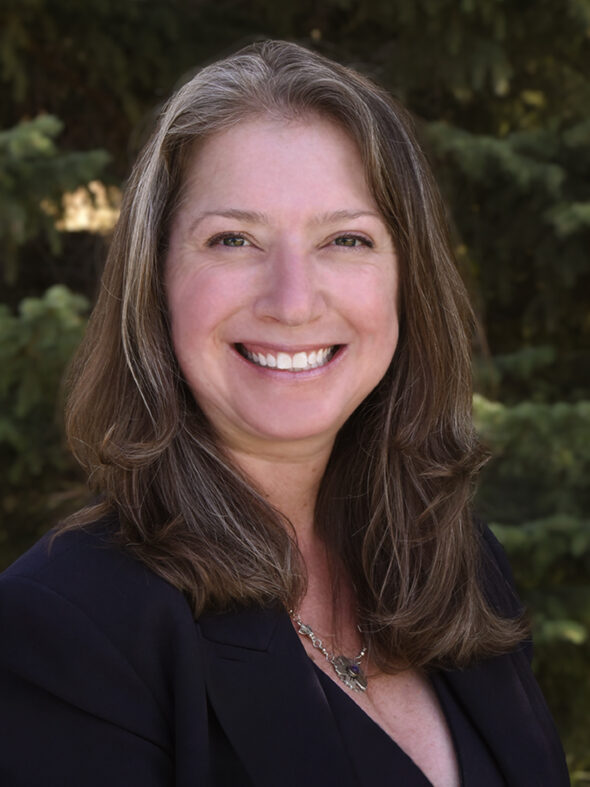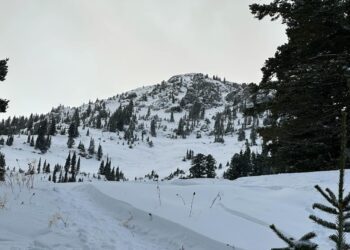Big Sky resident and contract attorney Alanah Griffith discusses a career in Gallatin County and objectives if she wins House District 60 seat
By Jen Clancey DIGITAL PRODUCER
Alanah Griffith remembers a time when she used to ride her horse along U.S. Highway 191 in Gallatin Gateway. The road, now a major route for commuters, visitors and residents, barely saw traffic when Griffith grew up in Four Corners in the 1980s. Griffith attended college in Naperville, Illinois, graduating from North Central College. Upon returning to Montana, Griffith studied at University of Montana School of Law and graduated in 2002.
She now manages Griffith & Associates private law practice as a contract attorney. She’s lived in Big Sky for the past 10 years and co-coaches the mock trial team for Lone Peak High School, and serves on the board of Morningstar Learning Center.
Some 40 years after a childhood in Gallatin County, Griffith is now running for a seat in the Montana House of Representatives on the Democrat ticket for district 60. House District 60 encompasses Big Sky, West Yellowstone and Gallatin Gateway. Upon an affirmative June primary, Explore Big Sky spoke with the candidate about her campaign for the house district seat.

Explore Big Sky: Alanah, thanks for taking the time to chat with us. So you grew up in the area. What was that like?
Alanah Griffith: It was different. I grew up in the Four Corners back when Four Corners wasn’t anything, but I went to the Monforton School and it was very much like Big Sky. It was a really close knit community, where the school was incredibly important to the community. And it was a great place to be raised. I had horses. I rode everywhere on the horses, and there was a lot of freedom.
EBS: What do you think is special about this part of Montana?
AG: I think it’s the access to our National Forest Service, our beautiful mountains, lakes or rivers and just the ease of getting outdoors.
EBS: What drew you to represent this area?
AG:There are a lot of reasons but it boils down to my son. When I grew up, people in the [Montana Legislature] were working together, they were reaching across the aisle. And we thought Montana is truly a purple state or, in some ways, non-political. We came together to try to solve the issues that we were facing in Montana, in the ‘80s … It wasn’t like anyone had a lot of money. We were facing an economic crisis and we came together and we solved it, and that’s not happening anymore.
I’m also looking at whether there’s going to be an outdoors for my son to inherit. I want him to be able to live here, afford a house and be able to actually go hiking and fishing in our waters and our mountains and what I saw is that might not happen. And what better way for me to preserve it than to run for legislature?
EBS: If you are elected for the Montana House of Representatives, what are some of your objectives?
AG: One of the big votes that is coming up is Medicaid expansion. That sunsets this year, and we have to vote on whether or not to extend it—I’d like to see it extended without the sunset. I work closely with a lot of nonprofits on affordable housing. So affordable housing is something that I would like to tackle as well as the property tax issue that was not addressed by the last session.
EBS: This year is kind of unique because of the supermajority and the possibility that things will change after November. What would that shift mean for the Montana Legislature and the House of Representatives?
AG: What does it mean, depending on who is in the governor’s office is maybe the Montana Legislature, the governor’s office is supposed to work as it’s meant to be. Montana has always done best, in my opinion, when there are two different political parties in office, where they have to work together for a balance. And if there was no supermajority, that means that Montana’s Democrats who are typically … fairly conservative Democrats can work with the moderate Republicans to bring common sense solutions to the legislature again.
EBS: I’m interested to learn more about your experience in the Gallatin county court system. How many years were you working in that area?
AG: So, in the court itself, I was there for two years. And I was the staff attorney for Judge Mark Gunther, who was a wonderful beloved judge, he was just amazing. Unfortunately, he got pancreatic cancer within six months of me being hired. So I ended up working for 24 different court district court judges who came in to help us. And it was eye opening.
You really saw everything that was happening that a lot of people don’t see in Gallatin County, between the youth in need of care cases, the mental health crisis, even—back then it was meth—now, it has changed to fentanyl. It was eye opening and I learned a lot.
EBS: What do you think you learned from that experience that really serves you now, as you campaign to represent this region?
AG: There are a couple of lessons that I took from that. One was patience. It takes a lot to listen to people in court but that was the most important thing that Judge Gunther did. He had the patience. And he listened. And those two qualities are something that I took away from that.
EBS: Do you think those lessons will be used in conversations when you’re in the legislature?
AG: Yes. It’s really important to listen to people to understand not only what their view is, but where it comes from. Because a lot of times, in my opinion, we’re coming from the same place. We’re coming from, for example, a place of wanting our children to have a Montana to inherit, and we just have different ways of getting there. And if we can understand that, maybe we can find that same way to get there or solutions that make more sense to Montana.
EBS: What do you think are some of the challenges that Gallatin county is facing right now?
AG: Well, Gallatin County—Big Sky, West Yellowstone, Gallatin Gateway—we’re all facing the housing crisis. Every single door I knock on, property taxes and the housing crisis comes up. We’re one of the most beautiful places in the country. And people want to move here. So how do we do that and make it available in a way where we, who were already here, can remain here? And our children could come back?
EBS: What do you think that solution is?
AG: It’s multifaceted … you wish you could just snap your fingers and there’d be a solution. The governor’s housing taskforce just came out with their final recommendations. I think if you look at those recommendations throughout all of their different reports, it gives us a really good picture of how we can solve the housing crisis. One of those is definitely going to be more on the local level, like the Big Sky [Community Housing] Trust. We are very, very lucky to have that and the funding behind it. But it does take arms. I think it’s going to take the stick and the carrot. The carrot is something we haven’t been implementing. And that’s more funds available for affordable housing for counties and local agencies to be able to fund that sort of program.
EBS: Would you say affordable housing is a major issue that you want to address when you’re in the legislature?
AG: Absolutely. My main things are property tax reform. It’s a really simple fix. Every year the legislature is given an adjustment to the property taxes—of what needs to happen for it to be equalized. And for the first time, in I don’t know how many decades, the legislature did not do it. For residential, [the tax rate] was about 1.35, I believe, and should’ve been dropped down to a .97 for the multiplier and that would have dropped our residential taxes significantly, and they did not do it. So, definitely going to be voting on that. If no one introduces it, then [I’d] introduce that legislation. Obviously I will be supporting a vote on the Medicaid expansion. And my other one is reproductive rights. I truly, truly believe in women’s reproductive rights and the ability of women to choose.
EBS: Maybe we can move on to the future of your campaign and what you’ll be doing next after moving forward from the June primary. What’s next for your campaign? Are you visiting anywhere, talking with anybody that you’re particularly excited about?
AG: We are knocking doors, and by we, it’s my whole team. The most important thing that I want to do is hit every door and we’re hoping to do three passes. I’ve knocked entirely within the new Hyalite region, which that’s absolutely new to this area. And now I’m knocking Big Sky, which is really fun because I’m knocking friends and family and the community stores.
EBS: What have you learned from people that you’ve had conversations with after knocking?
AG: I’ve learned that people are thoughtful. They’re living here because they love it. And they want us in the legislature to find solutions to mainly property taxes and affordable housing.
EBS: It was so nice to meet you.
AG: It was nice to meet you too.











